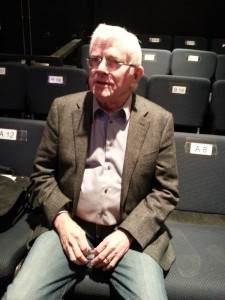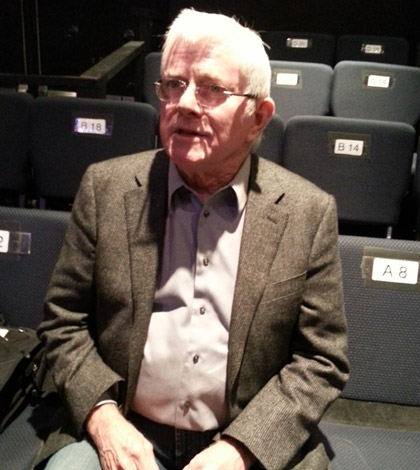
Talk show icon Phil Donahue railed against the Iraq War and blasted the media during a screening in Manhattan last week of his documentary Body of War, an emotionally powerful film mixing politics with the tragedies of an illegitimate conflict.
Produced by Donahue and Ellen Spiro, the documentary highlights the plight of Tomas Young, an American serviceman who was shot only five days into his first tour of Iraq in 2004. The gunshot left Young with a debilitating injury that has paralyzed him from the nipples down, and has drained him of life. Young, a paraplegic for the past nine years who is now in hospice care as a result of his worsening condition, recently announced he will refuse further medical treatment and give up the fight.
The 33-year-old, therefore, will soon be dead.
Donahue, always a fierce opponent the war, spoke of Young and Body of War with the passion and energy that made him one of America’s most popular TV personalities during his decorated nearly half-century-long career in broadcasting. He was forced out of the industry in 2003 by MSNBC after voicing disgust about the Iraq War on-air; the ousting came despite his show being the network’s highest-rated at the time.
Donahue hasn’t lost his edge, nor his desire, to shed light on the devastating impacts of the war—nor the politicians who voted to give then-President George W. Bush the power to invade Iraq.
“I do feel the media betrayed the country and most of media would agree with me,” Donahue said during an interview at the Culture Project, a theater on Bleecker Street, before the screening. “It’s awfully hard for a media to finesse this, every major metropolitan newspaper in this country supported the invasion of Iraq.”
Donahue met Young for the first time in 2005 at Walter Reed Army Medical Center in Maryland, as Young was “lying there totally wacked out on morphine,” he said; Young’s injuries the result of an insurgent ambush in Sadr City.
The documentary—and a scathing letter, dubbed “The Last Letter,” which Young wrote to Bush and former Vice President Dick Cheney and was published on the website Truthdig—has recently put Young’s story back in the spotlight.
Young blasted Bush and Cheney in the letter for their “cowardice and selfishness,” noting how they both found a way to escape the battlefield, yet condemn countless servicemen and women and innocent Iraqis to death. He also accused them of war crimes:
I write this letter, my last letter, to you, Mr. Bush and Mr. Cheney. I write not because I think you grasp the terrible human and moral consequences of your lies, manipulation and thirst for wealth and power. I write this letter because, before my own death, I want to make it clear that I, and hundreds of thousands of my fellow veterans, along with millions of my fellow citizens, along with hundreds of millions more in Iraq and the Middle East, know fully who you are and what you have done. You may evade justice but in our eyes you are each guilty of egregious war crimes, of plunder and, finally, of murder, including the murder of thousands of young Americans—my fellow veterans—whose future you stole.
The invasion of Iraq killed 4,486 Americans between 2003 and 2012, according to iCasualties.org. Countless other soldiers were seriously injured on the battlefield or still suffer from Post Traumatic Stress Disorder (PTSD) and other life-changing injuries.
Body of War chronicles Young’s journey, taking viewers inside the daily toils of a war veteran who struggles to even put on his pants or urinate on his own. Young relies on a cocktail of pills to keep him alive.
“It turns the whole family upside-down,” said Donahue, “and what we see…is a drama playing itself out in thousands of homes in this country that Americans never see.”
Young has “decided he’s had it,” added Donahue. “He really worked hard, he wanted to live, and he’s decided he’s going to die.”
Donahue, like Young, believes the Bush Administration should be prosecuted for war crimes. But he’s not naive enough to think it will ever happen.
“The presidency is too important to Americans to fail,” he said. “And the American people could not emotionally—in this moment in the history of our nation—the population would not emotionally tolerate a president in the dock for war crimes, so that’s a reality that I accept.
“I’m also hesitant to call them liars [regarding the non-existence of weapons of mass destruction in Iraq, which was the main justification for the Iraqi invasion],” he added. “Honestly, I think they believe what they were doing, but I think the major motive was: They wanted to go to war.”
Young, who enlisted in the Army two days after the Sept. 11 attacks, admits in the letter that had he suffered the same injury in Afghanistan he wouldn’t have spent the last nine years lashing out at the government:
Had I been wounded there I would still be miserable because of my physical deterioration and imminent death, but I would at least have the comfort of knowing that my injuries were a consequence of my own decision to defend the country I love. I would not have to lie in my bed, my body filled with painkillers, my life ebbing away, and deal with the fact that hundreds of thousands of human beings, including children, including myself, were sacrificed by you for little more than the greed of oil companies, for your alliance with the oil sheiks in Saudi Arabia, and your insane visions of empire.
For more on Body of War and locations where you can see it, click here.


























